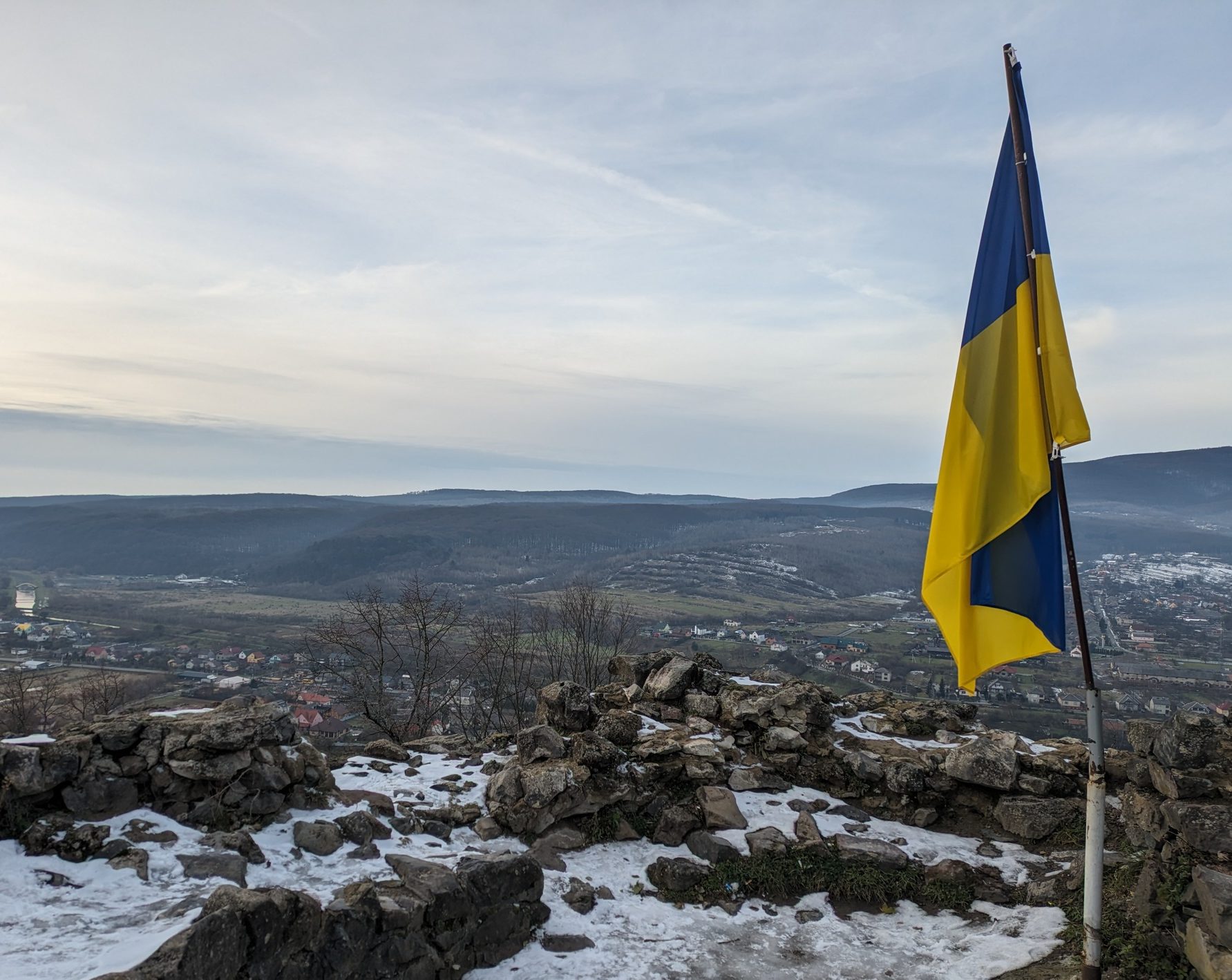David Boan
February 22, 2024
It has been a year since Cathedral of the Rockies (Boise FUMC) started the mission to form a sister-church relationship with the First United Methodist Church of Uzhhorod Ukraine. Our desire was to support Ukrainian people displaced by the war, and do so in a way that builds a relationship with a Ukrainian church.
Framing the mission as a sister-church relationship meant working on both sides of the relationship: educating and engaging our church as well as getting to know and working with the Uzhhorod Church.
The war in Ukraine made building a faithful relationship especially important. I knew from years of work in international relief that displaced people often believe that the rest of the world has forgotten them. I remember the story of the Lost Boys who wandered for four years, all the time thinking that not only had the world forgotten them but even God had tired of them. Further, the destruction that Russia has unleashed on Ukraine displaced an estimated 6.4 million people[1] and traumatized many more. Recovery and rebuilding will be a long, slow process. If we were going to start this relationship, we needed to be faithful.
Our model for this relationship is the Biblical concept of hesed, or faithful mercy or compassion. It was my experience that some Christian aid organizations distinguished themselves, not by the aid itself, but by being faithful servants. I remember seeing the Sendai (Japan) Baptist Church that sent a team to a coastal Buddhist village that had been destroyed by the 2011 tsunami. They thought they were going to mop up the mud, but when the Sendai mission team saw the total destruction of the village, they knew immediately that this would not be a simple cleanup project. They went to the villagers and said we will be with you as long as it takes to restore your village. Years later, after all other aid groups had left, the church mission team was still there, causing the villages to ask what makes you different from the others? That is how faithfulness distinguishes Christian missions.
We are working to create the same sense of faithfulness with our sister church in Uzhhorod. Our aims are several and include demonstrating to our own members how missions can be both a service and a relationship; to practice faithfulness as an essential part of a mission relationship; to learn how to form a meaningful relationship from 5,500 miles away; and to learn from our sister-church how we can grow together.
What does it mean to be a sister church? How do we know that we are fulfilling that aim? We could send financial support and satisfy ourselves that we are being compassionate, so what difference does it make to go beyond donation to forming a faithful relationship?
My wife Andrea and I capped off a year of mission by going to Uzhhorod in December 2023. We wrestled with the value of going to Ukraine versus sending the money we would spend on travel.
First, a bit of backstory. The Uzhhorod Methodist church is the oldest Methodist church in Ukraine. Uzhhorod has not suffered the bombing from Russia that has been inflicted on the rest of Ukraine. There seems to be two reasons for this. One is the location, which is about a mile from EU and NATO member Slovakia. Another reason is the Uzhgorod region was once part of Hungary and has a large Hungarian population. Hungarian Prime Minister Orban is a supporter of Putin. The people in Uzhgorod believe Putin promised that region of Ukraine to Orban to unite with Hungary if Russia defeats Ukraine.
It is also important to know that during the time we were in Ukraine the US Congress declined to take up the question of support for Ukraine. Our hosts only expressed appreciation for the support the US has provided and avoided saying anything negative, but it was clear that there was a general feeling of anxiety about the future. This is a common experience among people in need of outside assistance. The usual pattern is an initial level of high attention and support that soon starts to wane. The support for Ukraine has lasted longer than what we have seen in disaster scenarios, but the fear is that it will also soon fade. It was in that context that we went to declare our faithful support and asked if our presence with them was worth the cost.
So, when we asked our hosts if the cost of travel was worth it, the immediate answer was that the relationship was very important to them, and if we are to build a sustainable relationship then we need to have some time together. Traveling to be with them shows we are serious about knowing them. UMC Ukraine Superintendent Starodubets described how isolated they feel as the Ukraine borders closed and air travel ended. He described having people from the outside visiting with them as “like a breath of fresh air”.
So, our relationship is valued, and we believe it is making a difference, but still, what exactly does it mean to be a sister church. In reflecting on this question, I identified several aspects that mark a sister church.
Compassion – Knowing someone strengthens compassion. We are learning what specifically the people in Uzhhorod have endured and how we may have a part in comforting them. As we share the videos with personal stories from Uzhhorod in our church services, the general membership is getting the idea that this is something different, something special.
Seeking justice – All people sense injustice and are motivated to act, but especially so when you can see more personally the harm caused by the injustice. There are many dimensions to justice, but at the top of the list I would put restorative justice, which is to seek to repair the harm someone has experienced. Knowing someone fuels the desire to seek restoration.
Humility – I think this may be the most important dimension of all when attempting to build a relationship. It is easy for those of us in the US, when in the stronger position relative to those we minister to, to assume a superior role, or at least a stronger and less in need role. Getting to know someone and seeing their strength and courage can be humbling.
Faithfulness – We are all experiencing a degree of war fatigue. Faithful compassion is not easy. We went into the relationship with an expectation of being with the other for as long as needed. Now we need to do the work of sustaining that commitment.
In writing about this mission, we want to encourage, even urge, other churches to consider doing the same for the Ukraine churches. At the last annual conference, the Ukraine Methodist Church adopted four major goals, all of which are opportunities for Western churches to establish relationships.:[2]
- Establishing 2 development centers for the expansion of the church in Ukraine. Aimed both for discipleship training and as centers for rehabilitation from the trauma of war.
- Starting 10 new churches. Six in Ukraine, and four in Europe where Ukrainian UMC leaders have settled.
- Building a missional leadership pipeline.
- Developing a robust disciple-making system in all local churches.
Besides these goals, there are many opportunities to come along side humanitarian workers. For example, the denomination just approved supporting a pastor from Poland who is aiding displaced people in Ukraine. In a recent communication, Fred Vanderwerf (In Mission Together Ukraine) wrote:
“I just received word from Bishop Alsted that I can begin looking for partner/sister churches to support the work of Polish Pastor Jaroslav Bator who is helping in the Volhynian region of Ukraine, specifically in the town of Beresteczko. Pastor Bastor writes: “For the past 1.5 years I have been helping the hospital, social welfare home, poor families, disable children and other places. Currently I cooperate with the municipal social welfare center and together we provide various assistance to children. However, my funding from polish congregations is coming to an end, as they have their mind now on other projects, so I am looking for partner churches. I need some funds for fuel and some finances to do the necessary things related to pastoral services. When it gets warm I plan to being services.” [3]
You can see how Pastor Bastor refers to “projects” and the loss of support as churches have moved to other projects. His experience is in contrast with what the Uzhhorod church is experiencing. As we focus on the ten- and two-year anniversary of the war (It has been ten years since Russia invaded Crimea and two since the invasion starting the current war) our sister-church helped us put together a video of people saying what it meant to them to have this relationship. They said to us:
“I have a big family, and now it is bigger thanks to you.”
“We are a new family with you.”
“Even though we speak different languages, our spirits speak the same.”
“We believe God will bless our relationship.”
“Together, we can do great things for the Kingdom of God.”
“I am, grateful to God that we can speak with one another. Let’s continue to build this relationship.”
As we enter the second year of our Ukraine mission our work will include sharing what we are doing and encouraging others to find a way to support the church in Ukraine. Approaching mission as a time-limited project is fine and will be the best approach for many churches. For some who have the resources, there is an opportunity to build a deeper relationship that will benefit both sides. The sister church model is one model of mission that can work together with other models of mission work anywhere. Ukraine is a special case because of the war where the need is great and it is urgent.
There are several options for action. The In Mission Together Ukraine[4] can facilitate getting donations to Ukraine churches. They can also assist with supporting the aims from the annual conference. Our team welcomes your questions and are available to share more about our experience. We also work with the NGO One Collective that is building housing for displaced people[5].
[1] https://data.unhcr.org/en/situations/ukraine
[2] In Mission Together Ukraine February 2023 Report downloaded from https://conta.cc/49zCWjv.
[3] Email communication February 20, 2024
[4] https://advance.umcmission.org/p-222-in-mission-together-ukraine.aspx
[5] https://rebuild.transformukraine.org/


Leave a Reply